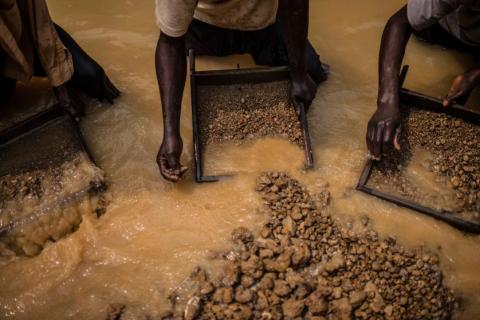
Resource-rich countries across the world and in Africa in particular have experienced tough economic times recently following drastic falls in commodity prices. This has further raised questions on how best these countries should manage their resources, allocate their revenues, diversify their economies and reduce the inequality gap.
A synthesis report prepared by the Independent Evaluation Group (IEG) on the World Bank’s engagement in resource-rich countries was the source of a joint learning event held at the Headquarters of the African Development Bank (AfDB) in Abidjan on Tuesday, May 03, 2016. Following a presentation of the report by Nicholas York, Director of the Human Development and Economic Management Department at IEG, and Konstantin Atanesyan, Senior Evaluation Officer at IEG and author of the report, Pietro Toigo, Chief Macroeconomist in the AfDB’s African Natural Resource Center, and Achille Toto Same, Principal Public Finance Management and Taxation Expert in the AfDB’s Governance, Economic and Financial Reforms Department, provided their views.
- Listen to: Interview with IEG's Nick York and Konstantin Atanesyan
- Photos of Joint IDEV/IEG learning event
Participants drawn from different departments of the AfDB subsequently exchanged knowledge on both the findings and the conclusions of the IEG report, with a special focus on how it applies to resource-rich African countries. Zambia was among the four countries studied for this report.
Here are three takeaways from the knowledge exchange session.
Natural Resource Booms do not Automatically translate to Reduction in Inequality
Zambia is internationally recognized as a major producer of copper. “From 2004 to 2012, Zambia experienced a combination of good economic policies and high rates of growth not seen since the early years after its independence” IEG’s evaluation finds. At the same time, inequalities widened in Zambia, says Konstantin Atanesyan. This suggests that it is not enough to be endowed with non-renewable natural resources - there are several other factors required to ensure that revenues generated from these resources translate into growth and reduction of inequalities. Some of these factors, according to Achille Toto Same of the AfDB’s Governance, Economic and Financial Reforms Department, include adopting the right inclusive growth-promoting policies and ensuring that strong institutions are in place.
Spend Wisely during ‘Good times’ and Diversify
In times of high commodity prices, countries endowed with natural resources tend to experience high revenues and generally impressive growth rates. But due to popular demands for spending on infrastructure, health, education and other vital sectors of the economy, these revenues are quickly depleted. “Resource-rich developing countries need to build up reserves during the upswing phase of commodity prices to counter the inevitable downward cycles,” writes IEG’s Konstantin Atanesyan. To achieve this, there needs to be a policy consensus across the political spectrum such as the one achieved in Chile. Also, the extractive sector may not always generate much employment. “Therefore, resource-rich countries also need to promote policies and create an environment conducive for the development of non-extractive sectors.”
Invest in the “Right Human and Physical Capital”
Finding a national consensus on which priorities to spend on during periods of economic growth is not always easy. IEG’s report acknowledged this fact. “The challenge for many of these countries is to design and implement the right human and social development investments,” says IEG’s Konstantin Atanesyan. As a solution, IEG’s report suggests that “countries experiencing economic boom as a result of natural resources should invest heavily in human and physical capital which will pay off later on and also create the cushion when the inevitable downturn happens.” At the peak of Zambia’s growth, investments in human and physical capital were not always economically justified, says Konstantin Atanesyan. This, according to IEG, is one of the ways through which the benefits of economic growth and revenues from natural resources could be widely shared within the society, contribute to human development, poverty reduction, and environmental sustainability.

